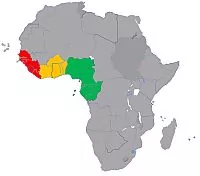President Muhammadu Buhari flew to the UK on 20 January for a holiday and was expected back in Nigeria on 6 February. However yesterday (5 February), State House announced that the president will extend his holiday to complete medical tests as advised by his doctors. No date has been given for his return, and the indefinite extension has fueled further suspicions regarding the president's physical capacity.
Nigeria has experienced this before. In 2009, the then-president Umar Yar'adua left the country in a similar way and did not return for months. Unlike Buhari, he did not notify parliament of his absence (so his vice Goodluck Jonathan would automatically become acting president as specified by the constitution). This created a power vacuum and the president's northern allies tried to prevent Jonathan from taking over, until civil society pressured parliament to vote for him to assume the position.
De Jure and De Facto
Under the constitution, Buhari may be removed as president on grounds of incapacity if two-thirds of his own cabinet resolve that he is no longer physically fit to be president. The Senate president would then set up a medical panel, including Buhari's doctor, to verify the president's health status and if the panel confirms that president is truly incapacitated, the Senate president and speaker of the House of Representatives would sign a notice of the incapacity in the government's gazette: effectively removing the president from office.
That said, it is improbable that Buhari's cabinet would expeditiously trigger his removal even if he is truly incapacitated or has passed away. Northern ministers would likely not support it and they are more than a third of the cabinet. So, as in 2009, civil society in the south may then pressure parliament to bypass this constitutional requirement and make Osinbajo president.
Acting President Osinbanjo
An Osinbajo presidency would likely be met with stiff opposition from northern politicians and Buhari's allies such as Babachir Lawal and Abba Kyari1—a situation that is already rumored to be happening. Such northern opposition would then be met with similar opposition by southern politicians and civil society, and destablising normal government business in the short term. The scenario would likely involve protests in both ends of the country, unsettling the business environment considering the likelihood of violence – until the situation is normalised.
Osinbajo's personality and background sharply contrast with Buhari's. While Buhari is a former military strongman with a hardline mindset, Osinbajo is a former law professor with a more liberal approach and greater devolution of authority to institutions and cabinet ministers. Further, despite his South-Western roots (Osinbajo is a bona fide Lagosian), the Vice President appears popular in the restive and oil producing South East than Buhari, who is yet to visit the Delta since assuming the presidency. This may grant Osinbajo greater efficacy dealing with militancy and separatism in that part of the country.
However, an abrupt change in leadership will weigh negatively on confidence and Nigeria's already ailing economy e.g. widening gap between official and parallel market exchange rates. His government would be hampered by the very circumstances that brought him to power and by distractions in the buildup to the 2019 presidential election, should he decide to contest. Economic and regulatory reforms (e.g. rail privatization) would be hampered for instance.
2019
Osinbajo's closest opponent in the 2019 presidential election would be from the north— for instance Atiku Abubakar, himself a former vice president. He is the most prominent northern politician and has already run for president three times. There were rumors that he was in contact with politicians working to create a new opposition party last year and that he might leave the ruling APC to run on another party's ticket before 2019.
An Atiku vs Osinbajo contest is the most competitive possibility, but whoever emerges as Osinbajo's top opponent, the outcome of that election would depend on how much popular backing Osinbajo can muster through his performance as president. It is the main political capital he needs to withstand resistance from the establishment.
Outlook
Buhari could eventually come back from holiday to reclaim his position as president, but his apparent health problems would likely diminish his capacity to function and also diminish his authority. Considering how he has placed himself at the centre of policy-making throughout his administration, this could further weaken government efficiency and worsen the logjam in governance that is already evident.
Nigeria's political risk rating is raised as a result of the ongoing circumstances, and will likely persist for the medium term no matter if Buhari remains president or Osinbajo substantively takes charge in the coming months.
Footnotes
1 Lawal is the secretary of state and Kyari is Buhari's chief of staff. While Buhari was on this vacation, Kyari once stood in for him at an event even though Osinbajo was acting president.

